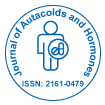Our Group organises 3000+ Global Conferenceseries Events every year across USA, Europe & Asia with support from 1000 more scientific Societies and Publishes 700+ Open Access Journals which contains over 50000 eminent personalities, reputed scientists as editorial board members.
Open Access Journals gaining more Readers and Citations
700 Journals and 15,000,000 Readers Each Journal is getting 25,000+ Readers
Indexed In
- Google Scholar
- Sherpa Romeo
- Genamics JournalSeek
- RefSeek
- Directory of Research Journal Indexing (DRJI)
- Hamdard University
Useful Links
Recommended Journals
Share This Page
Mary Taub

Biography
Dr. Mary Taub obtained her Ph.D. in Biochemistry and Molecular Biology from The University of California, Santa Barbara in 1976. Subsequently, she did postdoctoral work at The University of California, San Diego from 1976-1979. During her post-doctoral research, she developed a hormonally defined medium for the established kidney epithelial cell line MDCK, and discovered that MDCK requires Prostaglandin E1 or E2 requirement for growth serum free. A similar requirement was observed form primary mouse kidney epithelial cells. In 1979, Dr. Taub became a faculty member in The Biochemistry Dept. of The University at Buffalo. She became an Associate Professor in 1985 and a Professor in 1992. Dr. Taub’s laboratory continues to study the mechanisms responsible for the growth stimulatory effects of PGE2 on kidney tubule epithelial cells, as well as the mechanisms by which prostaglandins and other eicosanoids regulated differentiated function, including ion transport. Eighty-eight publications have come from this research.
Research Interest
Her laboratory studies the signal transduction pathways mediating the stimulatory effects of prostaglandins on growth and differentiated function in kidney tubule epithelial cell cultures in vitro. Both primary cultures and established kidney tubule epithelial cell lines are employed in these studies. Initially, they developed hormonally defined media for the growth of kidney tubule epithelial cells. PGE1 and PGE2 are essential growth factors. The involvement of EP1, EP2, EP3 and EP4 receptors has been studied by means of the pharmacologic approach. Genetics and molecular biology has been employed to study transcriptional control by eicosanoids. The relevance of renal prostaglandins in hypertension is being studied, as well as their role in cancer cell biology.
Publications
Physiologic Importance Of In Vitro Studies With Autacoids
Editorial: J Autacoids 2012, 1:e119
Global Speakers in the subject
Global Experts in the subject
Relevant Topics
Peer Reviewed Journals
Make the best use of Scientific Research and information from our 700 + peer reviewed, Open Access Journals

 Spanish
Spanish  Chinese
Chinese  Russian
Russian  German
German  French
French  Japanese
Japanese  Portuguese
Portuguese  Hindi
Hindi